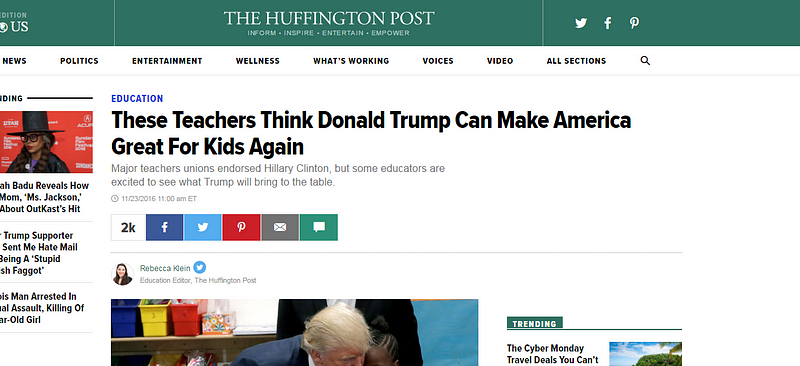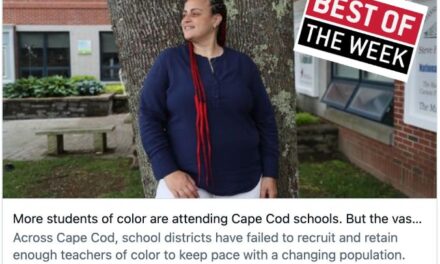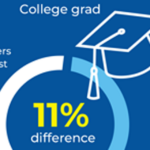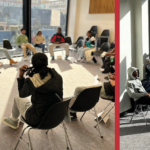Why education reporters should take a “subgroup” approach to their work.
By Alexander Russo
Kudos to USA Today’s Greg Toppo and the Huffington Post’s Rebecca Klein (and any others I’ve missed) for recently digging into what seems like a sorely under-covered issue: classroom teachers who don’t necessarily abide with the political decisions made by their local, state, and national union leaders.
In an 11/23 USA Today story, Toppo reported that about 20 percent of AFT members and more than a third of NEA members had voted for Trump. “Despite early and eager endorsements of Clinton by both unions, the nation’s school teachers and other school workers contributed substantially to Trump’s Nov. 8 win,” wrote Toppo.
White, college-educated teachers “outperformed other groups when it came to their support for Clinton” — but not nearly as universally as many would have imagined.
In a Huffington Post story that came out the same day, Klein introduced us to three different teachers who voted for Trump: an Ohio teacher who found himself one of the more affluent members of his downtrodden community and who liked Trump’s criticism of Common Core standards even if he wasn’t so supportive of charters and vouchers, a Chicago-area science teacher who appreciated Trump’s focus on economic issues and “hasn’t see any evidence that Trump’s campaign has caused an increase in school bullying,” and a Virginia teacher who liked Trump’s promise to “drain the swamp” of inside dealing in Washington. She told Klein she’s seen students who support Trump get bullied, not the other way around.
But that’s been about it. Few if any of the mainstream national outlets covering education — the NYT, Washington Post, AP, WSJ, NPR, etc. — seem to have realized or reported that there are substantial numbers of teachers who, like many others, weren’t voting on education issues but rather economic or ideological ones, and were voting independent of their union leaders.
Teachers are college-educated union members, most of them. Union members were voting for Clinton, or wished they could vote for Sanders. Some were mad at the DNC for favoring Clinton. But that was about it.

It made sense, on the surface. Trump didn’t have much good to say about teachers on the campaign trail, and has a long history of bashing them. But journalists are supposed to get beyond surface impressions. And it turns out there are lots of folks who are both union members and Trump voters out there — including teachers.
Teachers — nearly 5 million of them nationwide — don’t think or vote in lockstep, and don’t necessarily vote based on their occupation or on the issues on which reporters expect them to base their decisions.
__
The past three weeks have been full of media self-examination of Campaign 2016 coverage. A recent column here highlighted some of the coverage problems that relate to education news.
But there’s perhaps one additional approach that journalists could adopt. I call it the “subgroup” approach.
In federal education law, there’s a requirement that schools report the achievements of various subgroups — racial groups, economic groups, and ability groups — not just the overall performance of the whole. The rationale is that the overall average doesn’t mean much if there are substantial groups not being counted.
Let’s take this idea and bring it to media coverage of teachers and other large groups (parents, students, etc.), so that readers and policymakers get more than the majority opinion (or elected leaders’ views).
It’s not that hard — it just takes an open mind and a little asking around. Via email, Klein said she got the idea of reaching out to Trump supporters who were also teachers from an old-fashioned brainstorming session and found the teachers via social media using the #Teachers4Trump hashtag.
“There’s been a lot of talk about how Trump has negatively impacted classrooms, but obviously some teachers think he will make life better for their students — so why?”
ABOUT THE AUTHOR

Alexander Russo
Alexander Russo is founder and editor of The Grade, an award-winning effort to help improve media coverage of education issues. He’s also a Spencer Education Journalism Fellowship winner and a book author. You can reach him at @alexanderrusso.
Visit their website at: https://the-grade.org/












